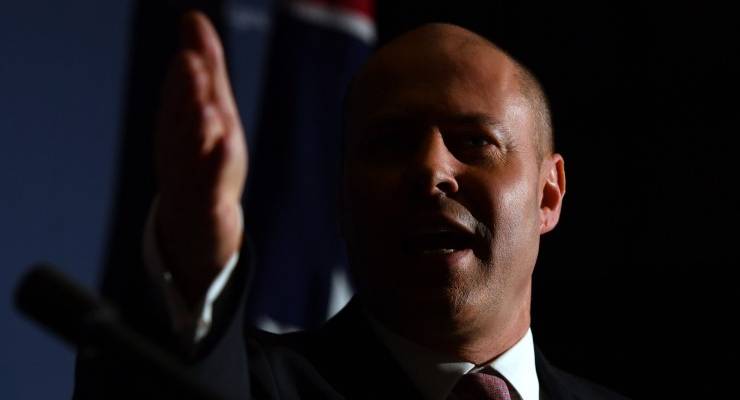
That was then, this is now The unedifying bust-up between Treasurer Josh Frydenberg and the entire state of Victoria continues. “They had a massive quarantine failure,” he told last night’s 7.30. “Then they had an inquiry that didn’t find anyone took responsibility or made the decision.” Fair enough. But then he went on: “People are sick of [Dan Andrews’] whingeing and his politicking of the crisis.’’ On RN this morning, he doubled down, saying the Victorian government is being “petulant, childish and playing politics”.
The rhetoric versus the reality of what support Victoria has received as opposed to New South Wales is explored elsewhere today. Regardless, it’s worth pointing out Frydenberg’s faux disgust at playing politics with the pandemic is utterly hollow. He spent chunks of last year exploiting the mental health struggles of Victorians (up to and including sharing the story of a friend of a friend’s suicide in Parliament) to score political points against Victoria’s Labor government. All this while his own government ceased JobSeeker — perhaps not realising what a boon to mental health the ability to eat and pay rent can be for some people.
Musical seats Beyond the hypocrisy comes the question: what the hell is Frydenberg playing at politically? Just who is going to be won over by continuing to dismiss Victoria as though 2020 didn’t happen? Even the Herald Sun is getting mad about the difference in approach. The recent Newspoll that showed a “clear path to victory” for Labor didn’t show any seats in Victoria swapping over. Yet. If anything, you’d think the feds might want to start making nice with the state.
Don’t call them by their name There was, surely, always going to be a furore regarding They Are Us, a film about the Christchurch massacre. The author Andrew Niccol has said it doesn’t deal with the attack so much as the aftermath, but according to the leaked script (via Newshub), there are 17 pages dedicated to the attack. Newshub has understandably focused on the trauma this could cause families of the victims.
But in some ways, whether the film depicts the act or not is irrelevant. Crikey has long covered the role media plays in mass shootings. Emeritus Professor Paul Mullen — who, among other things, interviewed the perpetrators of the Port Arthur and Hoddle Street massacres — tells Crikey that notoriety was a driver for mass shooters. Only one in 10 actually had a serious mental illness. Most are pathetic loners with a death wish and a desire that their life means something, anything. They follow a “script” they see in the coverage of previous mass shootings: the shooter’s face plastered over front pages, reporters raking over old diary entries, suicide notes or manifestos, films made about the horror. By narrativising the attack, however you portray it, you play a part in fulfilling that script.
Kelly talks Sometimes the raw material of an event is too much and it paralyses us here in the bunker. For example, what jokes or commentary could we add to the news that Paul Kelly is launching a podcast which is just him reading his columns aloud? To the headline in The Australian announcing it: “Nation’s voice of authority reimagined”? To the podcast title: Paul Kelly: Columns?
We await the audiobook compilation, which will presumably be called Paul Kelly: Columns: The Columns of Paul Kelly read by Paul Kelly. By Paul Kelly.
Called it MasterChef has been called for another year: there are again concerns about leaks affecting the betting market around the winners. Of course, it continues to raise questions about the folly of allowing people to bet on things that have already happened, not to mention things that can be easily controlled (a politician’s tie colour at the next press conference, for example, became common when the pandemic wiped out sport for a few months). Of course, Crikey readers would have known all this a year ago.








I am looking forward to the Frydenberg vote being wiped out in the next election; The Libs have a death wish in Victoria…
Agree. They seem determined to lose all their seats in Victoria. Along with Barnaby’s recent slur again Vic, a potential Banks Vs Hunt showdown, where on earth does the LNP win a seat in Victoria and do they hope to retain any?
Doubt Banks will be looking to return to that cesspool known as federal parliament.
Chisholm will be the one for them to lose. The word is Liu is already unpopular and she only held a pretty razor margin.
Be interesting to see if Dutton gets all antsy about any alleged “Chinese money” backing her.
Saw her chatting with another woman over lunch in a cafe in East Malvern last Monday. I didn’t bother her and neither did anyone else.
Hope you’re right The Gerb. I can’t see Victorians going to the next federal election with no memory of what has gone in with the Feds. Josh seems to be on a death wish. The jewel in the Liberal crown is looking very drab indeed.
Agree, also think QLD has become more important over time and replacing Victoria but that required a further lurch to the nativist right, but next election?
Paul Kelly doing audio says much about the ageing and declining readership of The Australian who no longer have their eyesight and/or cannot read?